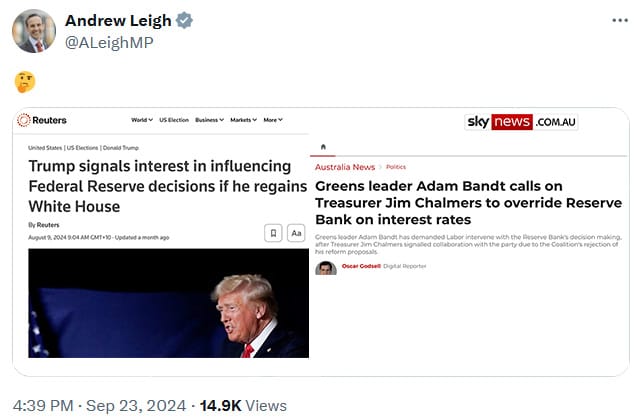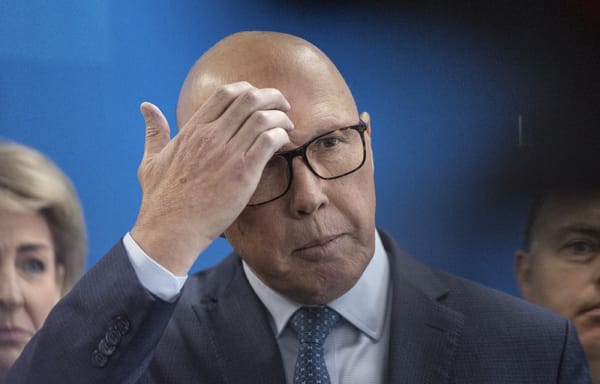The Greens are deeply unserious
The Labor government's potential deal with the Greens to eliminate negative gearing and reduce the capital gains tax discount may ultimately be more symbolic than effective in tackling Australia's housing affordability crisis.

Late last week the media went into overdrive when it was leaked that Treasury was investigating ending the Australian tradition of 'negative gearing' – deducting rental property expenses from other taxable income – along with the 50% capital gains discount for assets held longer than 12 months:
"A case of a political whodunnit emerged this week following reports the government was awaiting departmental modelling about the impact of changes to the tax break and the capital gains tax concessions."
It was a whodunnit because PM Anthony Albanese (Albo) spent days refusing to confirm or deny the rumour, or declare – if true – whether Labor was looking to take them to the next election. He insinuated that Treasury had looked into the issues of its own accord:
"The public service don't have to be told, I'm not their school teacher... what I want is a public service that's dynamic, a public service that does its job in the best traditions of the public service."
Andrew Leigh, the assistant minister to the Treasury, was similarly evasive, saying only that "I'm not across everything the Treasury is looking at, they will be looking at tax changes from time to time... we have a housing policy, and this isn't it".
That's fair enough; I'm all for a public service that is free to investigate policies that it thinks are in the nation's interest. That's their job, and then it's up to elected officials to weigh the evidence and decide if they're willing to roll with it.
But then on Friday things got even more interesting when we finally heard from Treasurer Chalmers, who confirmed that the order came directly from him:
"Speaking to reporters in Beijing, the treasurer put the case to bed by confirming he requested the modelling and the department did not act on its own accord.
'It is not unusual at all for governments or for treasurers to get advice on contentious issues which are in the public domain including in the parliament', Mr Chalmers said."
I try to avoid investing too much time into the dark arts (politics), but it's not a great look when the Prime Minister and Treasurer don't appear to know what the other is asking the bureaucracy to do, right? I can only assume the evasive tactics are because eliminating negative gearing was a policy former Labor leader Bill Shorten took to federal elections in 2016 and 2019, and lost both.
So, will Labor take negative gearing to the election? It's hard to say because Albo didn't explicitly rule the changes out, and Chalmers and Leigh only said it's not current policy. In other words, if it becomes policy – just like how the changes to the stage three tax cuts became policy after not being current policy for many months – they haven't technically fibbed.
That means there's a decent chance these changes do form part of the Labor government's economic agenda if it wins another term, so it's worth taking a look at them. But I also want to look at the possible motivation: why, after blaming these policies for the 'unlosable' election loss in 2019, would Labor attempt it again so soon:
"[Bill Shorten] said if he had his time again, Labor's tax agenda would have been more focused on income tax cuts instead of other measures like changes to negative gearing and capital gains tax."
I think there are two reasons. The first is Labor's inherent ideological suspicion of capital. And the second is the Greens, with whom Chalmers has been trying to win favour because the minor party has been blocking just about every key Labor policy in the Senate, from housing legislation to the Reserve Bank of Australia (RBA) reforms.
A deal with the devil
The latest polling shows Labor trailing the Coalition 52 to 48 on a two-party-preferred basis. Albo and Chalmers really need a couple of wins, and one way of getting them is by striking a deal with the Greens.
Unfortunately for Labor, that's just the way the Senate is stacked; of the 76 senate seats, Labor only has 25. To get a majority, it needs 13 votes from somewhere else and there are only 10 independents. The Greens have 11 seats, so realistically nothing is getting done unless it's bipartisan or Labor can convince the Greens and at least two independents to vote with it.
According to a report by the SMH citing insider information, that does appear to be the motivating factor:
"A pair of Labor ministers, who asked not to be named so they could detail internal discussions, backed the case to examine changes to negative gearing or capital gains tax because it would send a signal to younger voters that Labor was taking the housing crisis seriously and tackling responsible economic reform.
...
[One] minister confirmed changes to capital gains tax were also being examined, that Treasury was looking at capping the number of investment properties that could be negatively geared and that the focus would be on sending a signal to voters, rather than on raising tax revenue."
ATO data show that the average negative gearing deduction is $8,702, and more than 60% of individuals using it earn below $80,000 a year. So, the government might be looking at how feasible it is to "ban" negative gearing – winning over the Greens – but with the rules written so that they would only apply to corporations and those "I own 112 properties and here's how you can too" type investors.
In fact, that's a version of what the Greens have suggested in the past:
"The Greens have been calling for significant changes to negative gearing and capital gains tax discounts for successive election cycles. At the 2022 election the Greens called for negative gearing to be scrapped beyond a single investment property, and limits put on the capital gains tax discount.
With the delayed vote on Help to Buy expected in November, the Greens say the government now has two months to get this right, and they might have a deal."
Fewer than 10% of landlords own more than two rental properties – our land tax system already discourages large investors – so this might be popular enough with most voters to get across the line and win the Greens over.
There are two issues here. The first is negative gearing, which despite the provocative name isn't anything special; small businesses all over the country 'negatively gear' against their other taxable income every day. It's just when it's done with an investment property, many people tend get all worked up about it. I don't know why exactly, but I suspect it's because unlike in other industries, the property market is supply constrained and therefore unable to expand sufficiently to meet demand. That creates a fixed pie mentality: 'if an investor buys a property, then a renter can't'.
But the tax concession itself is generally considered to be economically efficient, notwithstanding equity issues: a recent paper by Cho, Li, and Uren suggest that removing negative gearing would create small welfare gains for around 70% of existing households, with younger landlords "hurt the most".
Still, the effects are small. Negative gearing raises house prices a little, while reducing rents a little. Tax reform is important, but going after negative gearing is like removing a single fish from the ocean of inefficiencies. It's just not going to matter in the broader scheme of housing affordability: $2.7 billion into a housing market of $11.2 trillion.
The second issue – the capital gains discount – is receiving far less media attention but in my view is much more important.
It was only a few months ago that Minister for Industry and Science Ed Husic was out extolling the benefits of getting businesses "to invest and to free up capital to do that" by making changes to the corporate tax, which is one of our most inefficient taxes. Yet now, because of declining polling and the need to strike a deal with the devil to get anything done, Labor is looking to move in the other direction: to eliminate the capital gains discount to appease the Greens.
If Labor has an ideological suspicion of capital, for the Greens it's the equivalent of kryptonite. But the capital gains discount is one of the few protections Australians still have against inflation (tax is calculated in nominal terms). It was put in place by the Howard government to replace the indexation system, which had created a "bias towards asset retention".
If the discount is removed, the overall tax burden will rise, and the long-run effect will be to discourage investment in the first place. Arguments can be made about whether capital should be taxed more, less, or the same as wages. Personally I care about the future, and given that the capital gains tax taxes future consumption at a higher rate than current consumption, I'd like to see it set as low as is possible (just high enough to disincentivise people from avoiding wage taxes).
The solution to this whole mess is to just ease the constraints on supply so that house prices don't go up every year. Then no one would even care about the capital gains tax discount because there wouldn't be any real gains to tax.
Breaking the social contract
The elimination of negative gearing and the capital gains tax discount, while economically inefficient, at least isn't as bad as some of the other Greens ideas. Such as this from senator Nick McKim:
"The RBA are not infallible high-priests of the economy, and they often get it wrong. Their decisions are nothing but political. The RBA's current monetary policy is driving a massive wealth transfer from younger to older, from borrowers to savers, from renters to landlords and from mortgage holders to the bank’s record-breaking, eye-watering profits. We wouldn’t tolerate unelected officials running the military without democratic oversight – why should we tolerate it in matters of the economy? If the RBA doesn't reduce interest rates at today's meeting then the Treasurer should use his power to bring them down."
The only part of that I agree with is the first sentence. Monetary policy is a whole lot of voodoo and no one really knows what's going on. Anyone that says otherwise – including those at the RBA – should be treated with a healthy degree is scepticism.
But it's important to think comparatively, and that's where McKim falls apart. If the Treasurer used his power to override the RBA, it would do serious damage to the institution of independent central banking, a model that has delivered lower inflation and no-higher unemployment than the alternative: political discretion.
It would break the social contract that holds the whole economy together, undermining confidence and distorting incentives for everyone from foreigners considering investing in Australia (we're very much a capital-starved nation), to households looking to buy their first home. As Nobel Laureate Douglass North wrote in his book, Understanding the Process of Economic Change:
"The structure we impose on our lives to reduce uncertainty is an accumulation of prescriptions and proscriptions together with the artefacts that have evolved as part of this accumulation. The result is a complex mix of formal and informal constraints. These constraints are embedded in language, physical artefacts, and beliefs that together define the patterns of human interaction."
The constraint ensuring an independent monetary policy is informal – there are no restrictions on the Treasurer taking control – because everyone knows that the alternative is much worse. The good news is that on this issue, Labor doesn't appear willing to compromise. At least if this tweet from Minister Leigh comparing the Greens' demand to Trump is anything to go by:

Finance Minister Katy Gallagher was also scathing:
"Well, I just think the Greens are out of control at the moment, full of self importance and out seeking populist approach to everything. It’s crazy what they’re saying to us. So if that’s their ultimatum, and it’s a bit unseemly, Nick McKim going around issuing ultimatums, no, we won’t work with that, because that is crazy. It’s economically irresponsible, and we won’t do it."
By jeopardising the informal constraint binding monetary policy, the Greens have proven that they're deeply unserious on all matters related to the economy. If you have to do a deal with the Greens to pass your policy, it's probably not worth it.
If Labor wants to win over voters, it should try introducing fewer inflationary policies disguised as 'cost of living relief' and get its own record-high spending under control, so that the RBA is able to independently ease rates before the next election.





